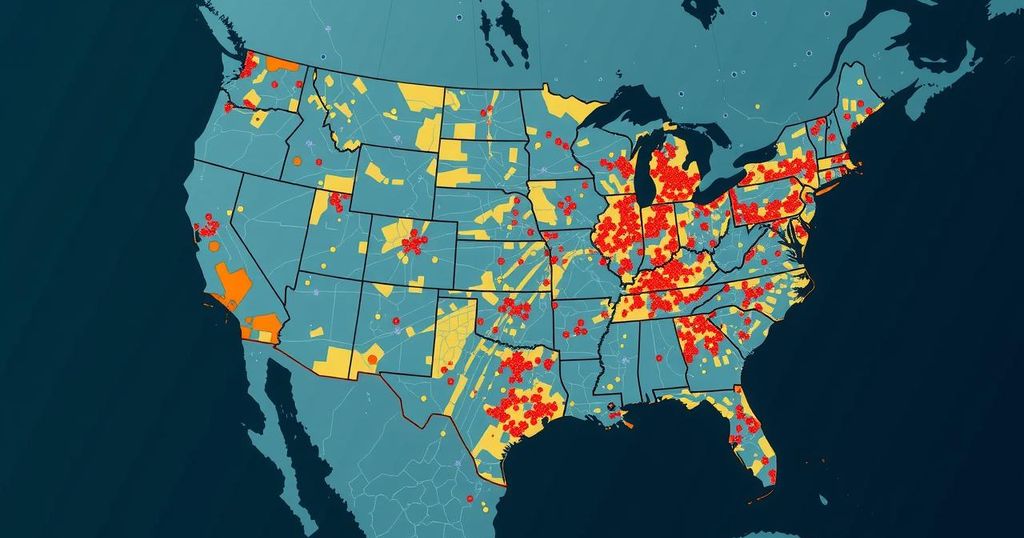Impact of Extreme Weather on Global Elections during the 2024 Supercycle

During the 2024 Election Supercycle, 14 countries faced severe weather disruptions affecting various electoral stages. Extreme heat in India and hurricanes in the US exemplified the challenges posed by climate change. The International IDEA’s Election Emergency and Crisis Monitor provides a comprehensive database highlighting these instances and their impacts on electoral integrity.
The 2024 Election Supercycle has been profoundly impacted by extreme weather events affecting national and subnational elections in 14 different countries, including prominent instances in Bosnia & Herzegovina, India, Mexico, Senegal, Tuvalu, and the United States. Many of these adversities were linked to the ongoing crisis of climate change, which resulted in disruptions at various levels of the electoral process, from voter registration to the announcement of results.
In February, Tuvalu faced a significant delay in the Prime Ministerial vote due to a storm and subsequent high tides that hindered the transportation of newly elected members from the outer islands to the capital. April saw the largest election in India, where extreme heat posed deadly risks to both campaigns and voters, leading to numerous heat-related fatalities among election staff. Additionally, June’s EU elections in Austria encountered heavy rainfall, resulting in the relocation of polling stations in Styria. Similarly, Mexico was gripped by a severe heatwave in July, leading to heat-related illnesses at polling places and preventing some voters from casting their ballots.
In October, five municipalities in Bosnia & Herzegovina postponed their local elections due to adverse conditions. Furthermore, in the United States, Hurricane Helene and Milton caused significant devastation shortly before the Presidential election, particularly in North Carolina, where over 200 fatalities were reported. In Senegal, major flooding in November disrupted the Parliamentary election process, affecting both voters and election observers.
The International Institute for Democracy and Electoral Assistance’s Election Emergency and Crisis Monitor (EECM) captures the electoral challenges posed by extreme weather, which includes a variety of disasters such as floods, hurricanes, heatwaves, wildfires, earthquakes, and volcanic activities across the globe. The EECM presents a comprehensive dashboard that includes 65 country briefs from 2001 to 2024, searchable by country, year, election type, and type of hazard. Each brief delivers critical analysis regarding the events’ impacts, procedural adaptations, and measures aimed at preserving electoral integrity and offers resources for a deeper understanding of these challenges.
The intersection of climate change and electoral safety has garnered increasing attention as studies reveal the significant effects of extreme weather on democratic processes worldwide. Natural disasters disrupt electoral cycles, posing threats to public safety and hampering the logistical framework necessary for fair elections. Understanding these challenges is essential for the adaptation of electoral processes to ensure consistent engagement and participation during crises. Various countries, particularly those in vulnerable regions, have experienced firsthand the detrimental effects of climate phenomena, necessitating thorough analysis and strategic planning to preserve electoral integrity and uphold democratic ideals amidst unavoidable challenges.
In conclusion, the 2024 Election Supercycle has starkly illustrated the challenges posed by extreme weather events on electoral processes worldwide. From delayed elections in Tuvalu due to storms to critical disruptions in the United States from hurricanes, each incident reveals the urgent need for comprehensive planning and adaptation in electoral practices. The data provided by the Election Emergency and Crisis Monitor highlights the necessity for electoral bodies to anticipate and mitigate the impacts of climate change on their operations, thereby ensuring the integrity of future elections.
Original Source: www.idea.int






